| Article Overview:
Who is the tragic hero in the current drama over War With Iraq?
Is it President Bush? Tony Blair? Saddam Hussein? Or
the United Nations itself? Since the Fifth Century B.C.
tragic plays have been acted out on the theater stage and the world
stage. How will this one end? Will it end in
tragedy or triumph? Find out. |
 VigilanceVoice VigilanceVoice
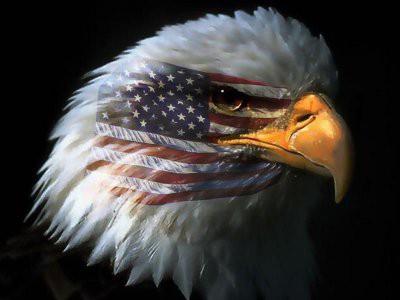
www.VigilanceVoice.com
Monday--March
10, 2003—Ground Zero Plus 544
___________________________________________________________
The Tragedy Of Vigilance
___________________________________________________________
by
Cliff McKenzie
Editor, New York City Combat Correspondent News
|
GROUND ZERO, New York City, Mar. 10--Is Saddam
Hussein rewriting Greek Tragedy for the 21st Century? It
would seem so, for the world appears to be applauding his battle to
rise from the ashes of Terrorism as the great victor over Good, and to
prove one more time that Evil and Good can co-exist despite the power
of Good.
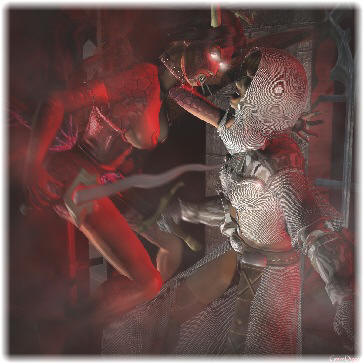 |
|
Good vs. Evil:
Can they co-exist? |
To decide if the
current conflict between the forces of "Good and Evil" fall within the
scope of classic Greek Tragedy, let's first examine what constitutes a
"classic Greek tragedy."
It all began back in 534 B.C. when Thespis,
a Greek playwright, invented an actor who conversed with the leader of
the chorus who represented what we might call today the United
Nations. The chorus was the "body of man," who commented
on the events and participated in them so that it was both involved in
the action and detached from it. The chorus' purpose was to ask
questions about the nature of man, his position in the universe, his
relation to the powers that govern life: the chorus offered
serious concern with the problems of man's fate.
This seems a reasonable parallel to the
nature of the United Nations. It sits detached, yet capable of
action. It cogitates the conflicts between nations in
respect to all other nations. But, in the end, it is
merely a chorus, not an actor. It is a backboard, not the
basket.
Now, to the key structure of a Greek
tragedy.
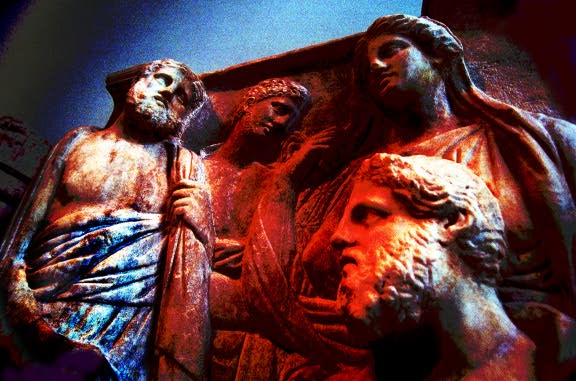 |
|
Does the
current conflict in the Middle East qualify as a Greek Tragedy? |
There were three
great masters of Greek tragedy, each of whom spun tales in the Fifth
Century B.C. and set up foundations for human beings to reflect up the
moral nature of themselves and others. They were
Aeschylus, Sophocles and Euripides.
Aeschylus examined the dangers of
overweening arrogance, the ancient rule of blood for blood and the
inevitability of the misuse of power. Sophocles didn't argue for
or attempt to justify the "ways of the gods" as did Aeschylus.
(Aeschylus may be likened to a Conservative, a fundamentalists by
nature who, even while finding fault, warned against change, warned
against opposing the order of things.)
Sophocles accepted the "ways of the gods"
as they are, treating them with awe and reverence, and drew from them
central truths, but his works didn't stop dead in their tracks.
His contribution was to burrow out these "truths" and hold them up to
the mirror of self-reflection. For example, to Sophocles, any
violation of the cosmic order creates suffering. However, he
held that suffering can redeem and exalt. He tended to be
compassionate toward his principle characters, showing sympathy for
them however deluded or broken they may be. (He may
have been a Liberal.)
Finally, there was
Euripides. He was the rabble rouser, the George Bush
challenging the U.N. Where Aeschylus and Sophocles
merely suggest the old ways may be wrong, Euripides criticizes them
boldly. He flew in the face of tradition, unafraid to stand up
to the "ways of the gods" as America and Britain are examples of in
their battering ram charge to denude Saddam of weapons of mass
destruction despite the "conventional wisdom" of the U.N. and even the
body politic.
Now, what comprises a tragedy?
Fundamentally, it is always a situation in
which man seems to be deprived of all outward help and is forced to
rely entirely on himself. It is usually a situation of
extraordinary tension, of utmost conflict. (Sounds
frightfully similar to the stand-off between the U.S. and the U.N.,
doesn't it.)
Greek tragedies include variations on two basic
tragic situations. The first is: man's miscalculation of
reality that brings about a fatal situation.
 |
|
The true
shapes of things cannot always be judged by their surface
appearances |
The second is that of a
man caught between two conflicting principles. In this
case, the protagonist is suddenly put at the crossing point of two
duties, both of which claim fulfillment.
Characteristic of the tragic catastrophe is
the fact that not only the protagonist comes to be destroyed, but very
often innocent people are also involved Everybody's fate
is connected in some way. (Again, it seems the U.S./U.N.
angst is fodder for another Greek tragedy)
The underlying current of all Greek dramas
concerns the laws and standards by which the gods let man live.
It is the paradox of Greek tragedy that it will never yield any
definite answers. The only result in each drama is one's
awareness of the unreliability and deceptiveness of human reason and
the realization that the true shapes of things cannot always be judged
by their surface appearance. And, one last but vital point, that
man's view and insight can be clouded over by demonic forces.
Greek tragic drama almost always
results in a catastrophe, yet the way in which the hero fails often
evokes our admiration for him. In his suffering, the
tragic hero attains a certain greatness. Tragedy is a form of
protest, a cry of Terror or complaint or rage or anguish to and
against whomever or whatever is responsible for "this harsh
attack," the cause of the suffering and death, be it God, Nature,
Fate, circumstance, chance or just something nameless.
Aristotle called the process of
viewing a tragedy "cleansing" for spectators. "By
participating vicariously in the grief, pain and fear of the tragic
hero or heroine, the spectator experiences pity and fear and is
purged."
Now, who is
the tragic hero in the play unfolding over Iraq? Is it Saddam?
President Bush? Tony Blair?
All three seem to fit the mould in
greater or lesser degrees.
Saddam seems to fall into the first
category--he has miscalculated reality. Despite sanctions and
agreements to disarm after the Gulf War, he has continued to expand
his weapons of mass destruction. When the U.N. issued Resolution
1441 unanimously, it was an indictment he had "miscalculated reality."
That reality was the United States would step up to the plate and put
such pressure on him to disarm that the world would back America's
position--and it did. At least for a while.
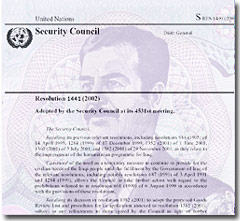 |
|
Resolution
1441: a "miscalculated reality" |
His
defiance of the "gods" turned on him. But then the winds
shifted to his favor. Slowly, he turned the spotlight of
Terrorism 180 degrees, back upon the United States and away from his
dodging and weaving. The tragic hero became America, no longer
the protagonist in the drama, but now the "evil one," the antagonist
bent on war. Saddam slipped through the Greek tragedy
curtains like Hamlet's ghost.
He has succeeded in rallying
the world behind him, a world that tends to ignore his "crimes" to one
that favors crippling America's arrogance because it threatened to
stand up to Terrorism with or without global assent. Saddam now
is the chorus, laughing out of one side of his mouth while the
lips on the other side smack the buttock of the U.N., France, Germany
and Russia.
Then there is Tony Blair, another
tragic figure in the modern drama. With only 15 percent of his
nation's public opinion behind him, Blair risks his political future
by standing alongside America against Saddam. One of his
top advisors threatened to quit if he sides with America against the
U.N.'s expected refusal to authorize force against Iraq.
He faces political tragedy if he continues supporting the U.S.
Blair seems to be
caught in the tragic vice of dual principles--that of his nation's
will and that of the overriding duty to the future security of the
world. While his nation's opinion is to stand by and be a
Greek drama spectator, Blair's concern is facing Terrorism head-on.
Personally, he has risked the wrath of the gods by supporting America
in a bitter political battle over a Complacent world of "cosmic
deities" who are punishing those who stand in defiance to their Titan
powers, or assumed powers. These are the members of the
U.N. Security Council, to which France has become its Jupiter.
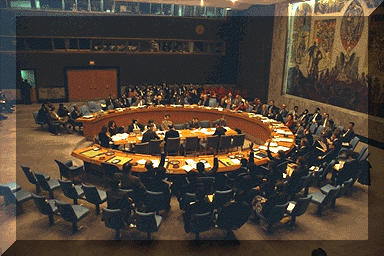
|
|
The UN
Security Council chorus sings "Que Sera, Sera..." |
Finally, there is
George Bush. He falls into both categories. He
too, has miscalculated reality and, like Blair, is being squeezed not
just by his duty to protect America but also to retain America's role
as the world's policeman. Tragically, the world--through the
U.N. chorus-- is shouting at him: "We don't want your help.
We've grown up. We can take care of ourselves. Boo!
Hissssss! Boo! Hisssss!"
Some might lobby to
expand the tragic hero ensemble to include the United Nations.
Its qualifications include a high degree of political hubris, a
shoe-banging history of arrogance toward one another, and its
factional self-aggrandizement as the world's "peace keeper" when it
tends to debate rather than act when the Beast of Terror rapes,
pillages and plunders.
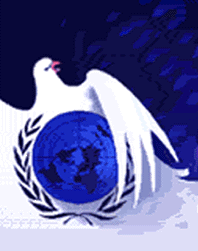
|
|
The United
Nations proclaims it acts as "peacekeeper" while closing its eyes
to the actions of the Beast of Terror |
It is especially
qualified today because a few months ago the body (chorus) voted
unanimously for Resolution 1441 to rid weapons of mass destruction
from Iraq, and now sing songs of support rather than admonishment for
Iraq. Iraq has become its "tragic hero," being bullied by
the U.S., a victim of American "imperialism" and "rush-to-war"
policies that do not settle in the caw of the U.N. chorus. And, its
more bellicose entrails are current waging virtual "war on America's
credibility, using the ploy of Iraq and Resolution 1441 to diminish
America's role as the world's unilateral peacekeeper and posit Europe
as the bold new Big Stick in world politics and power.
Sadly, in tragedies, there are no
conclusions. There is the presence of right and wrong,
good and bad, just and unjust but no exclamation points, no "ah hah's"
that suggest some punctuation or underscoring of any vital moral or
philosophical issue. The purpose of a tragedy is to expose
the frailty of human beings, and to remind the audience that they too
are vulnerable to such fragility. Therefore, it applies that the
U.N. Security Council, headed by France, Germany and Russia as lead
actors, should step into the tragic play spotlight.
Tragedies are also not about
something intensely sad or terrible. They do not end on a
pessimistic note. If they did, the effect upon the
audience would be one of intolerable depression. While the
evil forces in a tragedy most frequently destroy the tragic hero, the
tragedy rarely ends with evil triumph. This, hopefully, suggests
that Saddam Hussein and Kim Jong Il will be defeated ultimately.
This analysis of a classic
Greek tragedy presents us with a dilemma--what is the goal of a
tragedy? What's it payoff? Where is the asset in the
pile of pony dung?
Ultimately, its final curtain is a reminder
that we, as human beings, have room to improve. It reminds
us that despite all our failings and faults, all our blindness and
self-seeking, that there is Hope just over the horizon.
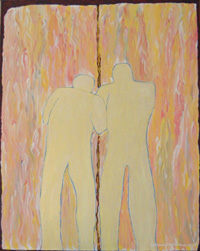
|
|
The Final
Curtain reminds humans we have room for improvement |
In one of the great
Greek myths about Pandora's Box, the legend goes that when Pandora
opened the box, sent by Jupiter who was angry that humans could live
without his power and ruler ship, out flew all the pains and sorrows
of the world. Jupiter was, mankind's first Terrorist, our first
Saddam Hussein, our first Genghis Khan, our first Hitler, our first
Kim Jong Il. His weapons of mass destruction were pride, anger,
greed, lust, envy, gluttony and sloth, the Seven Deadly Sins he had
sent, a virulent weapon to drive humans into depression and despair,
to force them into a constant state of Fear, Intimidation and
Complacency.
But Vigilance was close on the heels of
Terrorism, even in those legendary days. One of the gods
above had taken issue with Jupiter's wrath against humans, and slipped
in one more item in Pandora's box--it was Hope.
As Pandora, so the story goes, is screaming in
pain and anguish as the faults of humanity bore into her soul, she
heard a plea from inside the box she had dropped when the Seven Deadly
Sins flew out like banshees from Hell to turn the peace and prosperity
of earth into a state of Terror.
Painfully, she opened the box one more time and
let out the Hope that had been nefariously slipped in by a god of
Vigilance. Hope offered humans Courage to overcome Fear,
Conviction to displace Intimidation, and Right Actions for the
Children's Children's Children as a tool to digest Complacency and
focus the world on a singular goal--to improve the lot of humanity for
the innocent, those yet not infected by the Seven Deadly Sins.
It is this critical part of the Greek
tragedy that I believe the world should focus upon, and not the
disquieting Seven Deadly Sins that fly up to blind us to Hope's
germination.
World leaders have for eons been
given the powers of gods. They have been treated as the Titans
and Jupiter's of the world, issuing edicts to the people from trumpets
of despotism and tyranny, to the disguises of democracies and
republics.
Over these eons, the average man and woman
has abdicated his or her role of Generational Leadership to these
bodies of tragic power, whether they be Presidents, Prime Ministers,
Kings, Emperors or heads of the U.N. Security Council.
If we look at the real tragedy of
human growth, we see leaders unable to lead, powers that have no
power, nations that have no spine, and other nations willing to risk
the security of the world to feather their own beds.
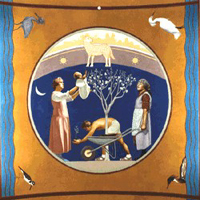
|
|
Human growth
will come from the Vigilance of Hope |
That leaves us,
the people, as mere spectators to an endless marquee of tragic plays
in which national and world leadership holds in its grasp the destiny
of the globe.
Our not-so-new enemy, Terrorism, has
brought the audience into the tragic play. Terrorism infects
all. It passes through the porosity of cultures and borders,
slithers around the barricades of ethnicity and politics as though it
were some alien from egregious planet far in space.
It strips the world of what we have
known as "leadership," vis-à-vis the rancor currently demonstrated by
the not-so United Nations. It enfolds the audience onto
the stage, demanding that the Citizens of Vigilance stand up and be
counted or suffer the tragic consequences of leaving their children's
destiny in the hands of those who cannot decide who the enemy and ally
is anymore.
. The average person truly stands
rudderless in the churning Sea of Terrorism. But as any
tragic play offers, there is Hope. That Hope is that
people will awaken from their roles of subservience into roles of
leadership.
If the scene plays itself
out to ultimate final curtain, it tells us we, the people, will
rise out of the ashes of the tragic hero spotlight and become
Sentinels of Vigilance.
It challenges each of us to
become a collection of Global Parents of Vigilance, denying the past
false belief that there is a King of Vigilance or Queen of Vigilance
ruling over us who cares more about our children's future and security
than we care, or can protect them from Terrorism's wrath and harm more
than we, the Guardians of Vigilance.
If we truly care about the
future of the world, and the removal of Terrorism, then we, the
audience of the current tragedy, must rise to the occasion and take
the Shield of Vigilance and Sword of Vigilance in our hands and march
as a single, unified body against Terrorism of all sizes and shapes.
That means we must be willing to fight both the Beast of Terror that
threatens us from the outside, and the Beast within each of us that
seeks to strangle us with constant petty Fears, childish Intimidations
and sanguine Complacencies that make us think we are mere grains of
sand on a beach filled with giant rocks.
 |
|
We are Leaders
of Vigilance and can drive Terrorism from our lives |
We do
not have to wait for anyone to authorize us to become Leaders of
Vigilance. We have always been, and always will be in charge of
driving Terrorism from our lives. The tragic play is
not about tragedy. It is about fallibility. It is
about our failings to rise above our selfish, self-seeking shells in
which we tend to curl while we await others to build the castle walls
and drive off the Dragons of Terror.
Each one of us can battle Fear
by mustering One Percent more Courage, and tackle Intimidation by
flexing the muscles of Convictions by One Percent more, and, we can
keep our focus clear so we don't become victims of Complacency by
targeting our objective with Right Actions to protect the Children's
Children's Children from the slings and arrows of Pandora's Box.
We can each enlist ourselves in the
War Against Terrorism by taking the Pledge of Vigilance and being
willing to become Leaders of Vigilance not mere spectators.
We can create a nation of Parents and Citizens of Vigilance who will
have far more power than any leader or any United Nations when it
comes to protecting our children's future, and their Children's
Children's future.
 |
|
There is Hope
the Parents of these children will sing the Song of Vigilance |
So as the curtain falls on yet another tragic story of
human Complacency, of abdication of individual rights
to those who allegedly rule us, let the chorus sing a
new chant. Let them sing the Pledge of Vigilance
so loudly we will pass through the fog of the Seven Deadly
Sins into the light of Vigilant Hope.
You will
know when you have passed through the fog. It will
be the day you take the Pledge of Vigilance and take charge
of paving the way for your Children's Children's Children's
future peace and prosperity.
The only
real tragedy would be if you did nothing.

Mar. 9--Conversation
With God: Will Saddam Escape Death?
©2001
- 2004, VigilanceVoice.com, All rights reserved -
a ((HYYPE))
design

|
|
|